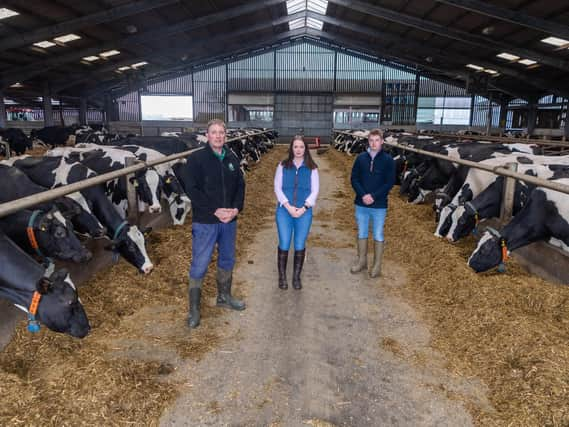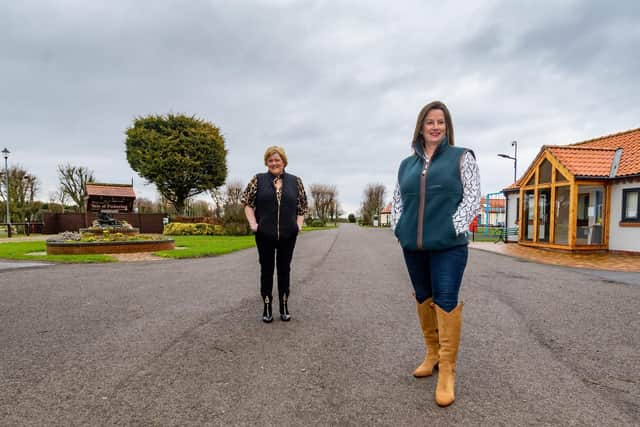Farm of the Week: Juggling a dairy herd, arable crops and a caravan park in the Vale of Pickering


“Every member of the family has an important role,” said Chris, who runs the dairy and arable side at Carr House Farm in Allerston, North Yorkshire.
Diversification has seen Chris’s brother John running a construction company which was born through improvements being undertaken at the farm; their sister Wendy is the farm secretary with wives Diane and Helen running the caravan park.
Advertisement
Hide AdAdvertisement
Hide AdWhen the farm tenancy was taken on in 1953 by Chris and John’s grandfather Walter and father Tony, the then 150-acre Carr House had no running water or electricity.


“Grandad and Dad worked hard to establish the roots that have enabled us to grow,” said Chris.
“The farm was a bit more mixed back then, but they gradually built up the dairy herd from 25 to 45 cows and we moved from British Friesians to the Carrvale pedigree Holstein herd in the 1970s.”
Chris, who is also chair of the Whitby Dairy Discussion Group, said he and John were both in their early 20s and “very keen” when the family partnership bought the farm in 1980 as sitting tenants.
Advertisement
Hide AdAdvertisement
Hide AdShortly afterwards they increased the herd to 90 cows and milking three times a day.
“We milked that way for seven years and our herd average went to 8,000 litres, which was a big yield back then.
“The next big step came in 1984 when we were given permission for 58 caravans, from the five we had previously and it became the Vale of Pickering Caravan Park.”
The caravan park, that now runs to 220 pitches, led to John setting up Stockdale Construction.
Advertisement
Hide AdAdvertisement
Hide Ad“John put together everything on the park from foundations to tarmac roads to water, sewage pipes, all service amenities and as a result he had other farmers, businesses and individuals contact him,” Chris said.
However, he said his own future was always destined to be with the cows.
“I always wanted to farm. We have the dairy herd and grow winter wheat, winter barley, maize and grass for silage and grazing. Over the years we have bought additional blocks of land and own 240 acres with 180 rented.”
The family have made some major investments in recent years including a new dairy unit.
“The whole dairy unit was dated,” said Chris.
Advertisement
Hide AdAdvertisement
Hide Ad“We took the decision to renew it all including new sheds, parlour and bulk tanks.
“We put in a De Laval 20/20 parlour with automatic backing gate and other automated features, increased our herd from 100 cows to 170 and took our performance uplift further to 10,500 litres per cow per year, with 4,000 litres produced off forage.
“The new parlour cut our milking times from three hours to two.”
Looking at the herd’s welfare also led to some changes as Chris explained.
Advertisement
Hide AdAdvertisement
Hide Ad“The cows had been on straw previously, but we put in new sand bed cubicles which increased their comfort and also brought down mastitis. We sell our milk through Arla and we are now on an Arla Morrisons 360 contract.
“It is a top performance contract that is very strictly controlled. You have to jump through hoops to get it and over a period you are flagged up as a high-quality producer. We’ve now been in it for 18 months and receive a premium.”
Chris said they calve the herd all year round with half grazed on a paddock plate metred system, which records grass height. The other half are inside as newly calved cows and will go out to graze in the summer.
Sexed semen is used on newly calved heifers with the rest of the herd put to Wagyu AI and supplied to Warrendale Wagyu in York.
Chris said the Wagyu are going from strength to strength.
Advertisement
Hide AdAdvertisement
Hide Ad“They calve very easily and are straight on their feet, very thrifty.
“They really suit our system and they go to farmer Roy Thompson in Cranswick just 15 miles away, which is great for our sustainability and carbon footprint.”
The arable operation sees a short rotation of either maize, wheat and barley or grass, wheat and barley. Chris said that the land type is loam over clay and very easy working. “We are 90ft above sea level and above the River Derwent so we don’t flood.
“We aim for around four tonnes per acre on winter wheat and have been close to that recently, with 3.25 tonnes on winter barley.
Advertisement
Hide AdAdvertisement
Hide Ad“We’re growing 105 acres of winter wheat variety Kerrin this year with a third going as caustic wheat for the cows, 65 acres of winter barley six-row hybrid variety Libra with 20 per cent for feed, and 60 acres of maize, which we will sow around the end of April.”
Chris said they bring in contractors for harvesting, muck spreading and forage work and handle cultivation and fertiliser application themselves.
Chris said they also work with an agronomist using precision techniques including soil mapping which he said has helped modify their inputs.
But Chris said he also still believes in the plough. “We are still ploughing and combination drilling - and we use farmyard manure. I still think soil inversion will be what everyone comes back to.”
Advertisement
Hide AdAdvertisement
Hide AdWhile the Stockdales have taken calculated risks in expanding their dairy farm and caravan park, Chris said they are not looking at growing too much further in the future.
“I have no interest in taking us to a 500-cow dairy herd, but with our children, Chloe and Thomas, both currently at agricultural college and already involved on the farm, I could see us growing numbers a little further.”
“The emphasis here is all about family,” said Chris.
“We’ve always believed in what we were doing - even if everybody else has sometimes thought we were crackers.”